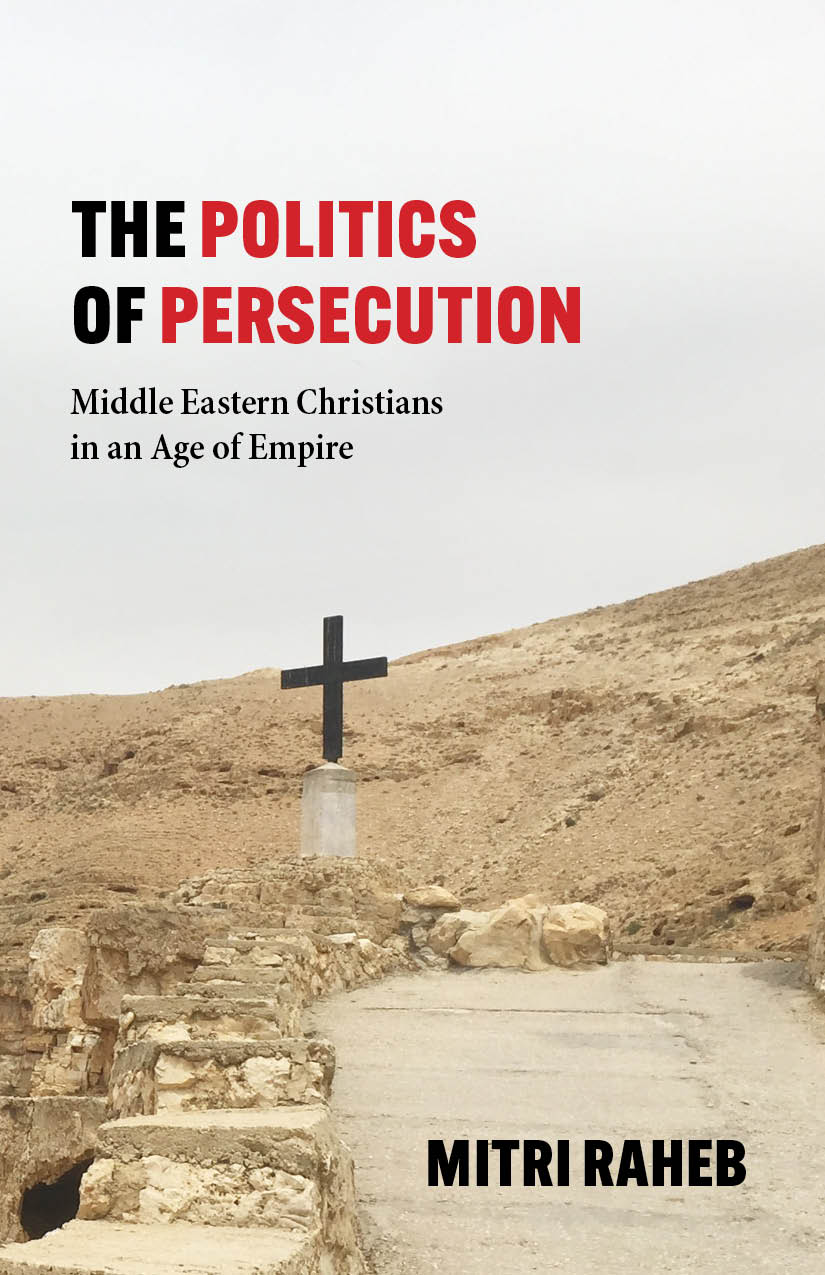 During the twentieth century and now into the twenty first, White Christian evangelicals have claimed that their standing in the US socio-political landscape is under attack. Even though they have enjoyed political and religious dominance in the US, they believe that they are now the persecuted, and that their persecutors—Blacks, Latina/os, LGBTQI+ persons, and other minorities—are plotting their demise. The perception of Christian persecution is not a new one, as Mitri Raheb demonstrates in his most recent book, The Politics of Persecution: Middle Eastern Christians in an Age of Empire, nor is it monolithic. In this monograph Raheb traces the particular histories of Christians in the MENA (Middle East and North African) region who have long served as pawns in the political machinations of empires, including those of White evangelicals in the US. The latter, while more than willing to claim the mantle of persecution for themselves, are far less likely to extend such claims to Palestinian Christians. Who is able to claim the mantle of being persecuted in the Middle East, as Raheb shows, more often has had to do with what suits the interests of European and US powers, rather than the realities of those who live in the region. In the current moment, we find expressions of sympathy (or lack thereof of) for the plight of Middle Eastern Christians still enmeshed in the operations of empire.
During the twentieth century and now into the twenty first, White Christian evangelicals have claimed that their standing in the US socio-political landscape is under attack. Even though they have enjoyed political and religious dominance in the US, they believe that they are now the persecuted, and that their persecutors—Blacks, Latina/os, LGBTQI+ persons, and other minorities—are plotting their demise. The perception of Christian persecution is not a new one, as Mitri Raheb demonstrates in his most recent book, The Politics of Persecution: Middle Eastern Christians in an Age of Empire, nor is it monolithic. In this monograph Raheb traces the particular histories of Christians in the MENA (Middle East and North African) region who have long served as pawns in the political machinations of empires, including those of White evangelicals in the US. The latter, while more than willing to claim the mantle of persecution for themselves, are far less likely to extend such claims to Palestinian Christians. Who is able to claim the mantle of being persecuted in the Middle East, as Raheb shows, more often has had to do with what suits the interests of European and US powers, rather than the realities of those who live in the region. In the current moment, we find expressions of sympathy (or lack thereof of) for the plight of Middle Eastern Christians still enmeshed in the operations of empire.
What Raheb’s book in particular adds to our understanding of this phenomenon is a deep historical engagement that locates the plight of Middle Eastern Christians in a longer arc of colonial history and the history of empires. Raheb begins his story with the Ottoman Empirem where he gives an account of the treatment of Christians within the millet system. He is not nostalgic for the pre-colonial European Ottoman system, which surely did treat Christians as second-class subjects. But his history is also one that is decolonial, and as such refuses to see in the Ottoman system an imperfect precursor to the liberal nation state system, under which Middle Eastern Christians would arguably fare much worse than under the Ottoman system. In subsequent chapters, Raheb explores the role of European missionary activities in the region and their often symbiotic work with imperial and colonial forces, the effect of the Nakba on Palestinian Christians, and the more recent decisions of US administrations to fly the banner of religious freedom in the Middle East only when it suits their purposes. And it is this latter point that resurfaces again and again in this text. Who is able to claim that they are being persecuted or lacking in freedom, and thus able to reap the benefits of others recognizing that claim, is unevenly distributed and marks not the suffering of those living under oppressive rule, but those with vested interests in marking some as persecuted and others as not, thereby bypassing the need to interrogate political forms of violence defining all Palestinian lives regardless of religion. The latter move, often enough as Raheb shows, acts as a pre-text to further intervention in regions not under colonial political control.
What Raheb’s book in particular adds to our understanding of this phenomenon is a deep historical engagement that locates the plight of Middle Eastern Christians in a longer arc of colonial history and the history of empires.
The contributors to this symposium explore this theme in a variety of ways. Candace Lukasik, for example, takes Raheb’s geopolitical framing of persecution into reflections about her own work with diasporic Coptic Christian communities in the US. What Lukasik finds in doing so is that as communities move from one context to another, their identities as a persecuted minority transform. In this case, Coptics reframe their persecution in Egypt through the US framework of Christian persecution in ways that lift up their Christian identity and downgrade their MENA identity in keeping with US geopolitical framings. Omer likewise takes Raheb’s argument and thinks with it in new contexts. In particular she puts Raheb’s book into conversation with the recent documentary film directed by Maya Zinshtein, Til’ Kingdom Come, which examines the role of Christian Zionists in the US supporting groups who help fund the Israeli military and settlement and annexation projects. This support has been welcomed by some in Israel despite the overt antisemitism expressed by Christian Zionists in the US. Indeed, so-called philo-semitism is antisemitism. The deep irony and tragedy of this story comes in the way that Christian evangelicals fail to see Palestinian Christians as co-religionists and as bearers of human rights and dignity, despite their shared faith. In the film, this is most starkly revealed when a pastor from Kentucky claims, following a conversation with a Lutheran Pastor in Bethlehem, that there is no such thing as a Palestinian. Here, recognition fails because of the Christian Zionist lens that constructs “real” Christians as White evangelicals and Christians living under occupation in Israel/Palestine as non-existent. The persecuted Christian again here is tied up with the politics of empire and nation.
In his contribution, Gary Burge also brings in further reflections on the complicity of the west in forms of violence throughout the MENA region. Burge first focuses on the western political violence that has damaged Christian communities in the region before turning to the role of Islamophobia in shaping who are considered victims of religious persecution. He finally turns to a criticism of Raheb, not for his harsh words for Evangelicals in the US, but for his lack of them. Burge worries that Raheb lets American Evangelicals off the hook and calls for an even more strongly prophetic voice to counter their message.
If Omer, Lukasik, and Burge extend Raheb’s critical account of Christian Zionism and Evangelical complicity in the suffering of Christians in the MENA region, Mourad Takawi highlights the moments of hope that surface in Raheb’s text. Takawi finds in even the most horrendous episodes of violence recounted in Raheb’s text moments that illuminate alternative futures for those suffering under the weight of oppression. He delves more deeply into the example of Butrus al-Bustani (1819–1883) to illustrate this. Raheb pens a response to these contributors which takes up the central themes analyzed in each of these essays.
This mixture of trenchant critique that is attentive to multiple layers of identity formation—including, but not limited to, religious, ethnic, national, and racial identities—and constructive imagining of ways of forming community beyond those identities is necessary as we confront populist forms of authoritarianism. The latter mobilizes the rhetoric of persecution to further marginalize the most vulnerable in societies around the world. In this symposium the author and contributors alike draw us to the urgency of this analysis and help us chart ways forward beyond our current frameworks.

